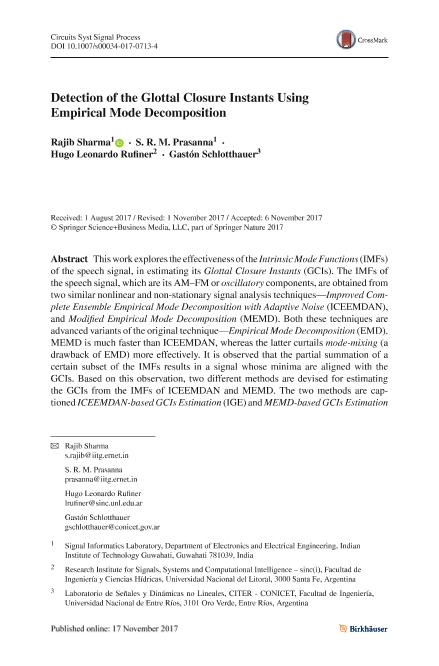Artículo
Detection of the Glottal Closure Instants Using Empirical Mode Decomposition
Fecha de publicación:
11/2017
Editorial:
Birkhauser Boston Inc
Revista:
Circuits Systems And Signal Processing
ISSN:
0278-081X
Idioma:
Inglés
Tipo de recurso:
Artículo publicado
Clasificación temática:
Resumen
This work explores the effectiveness of the Intrinsic Mode Functions (IMFs) of the speech signal, in estimating its Glottal Closure Instants (GCIs). The IMFs of the speech signal, which are its AM–FM or oscillatory components, are obtained from two similar nonlinear and non-stationary signal analysis techniques—Improved Complete Ensemble Empirical Mode Decomposition with Adaptive Noise (ICEEMDAN), and Modified Empirical Mode Decomposition (MEMD). Both these techniques are advanced variants of the original technique—Empirical Mode Decomposition (EMD). MEMD is much faster than ICEEMDAN, whereas the latter curtails mode-mixing (a drawback of EMD) more effectively. It is observed that the partial summation of a certain subset of the IMFs results in a signal whose minima are aligned with the GCIs. Based on this observation, two different methods are devised for estimating the GCIs from the IMFs of ICEEMDAN and MEMD. The two methods are captioned ICEEMDAN-based GCIs Estimation (IGE) and MEMD-based GCIs Estimation (MGE). The results reveal that IGE and MGE provide consistent and reliable estimates of the GCIs, compared to the state-of-the-art methods, across different scenarios—clean, noisy, and telephone channel conditions.
Archivos asociados
Licencia
Identificadores
Colecciones
Articulos(SEDE CENTRAL)
Articulos de SEDE CENTRAL
Articulos de SEDE CENTRAL
Citación
Sharma, A. Surja; Prasanna, S. R. M.; Rufiner, Hugo Leonardo; Schlotthauer, Gaston; Detection of the Glottal Closure Instants Using Empirical Mode Decomposition; Birkhauser Boston Inc; Circuits Systems And Signal Processing; 11-2017; 1-29
Compartir
Altmétricas




